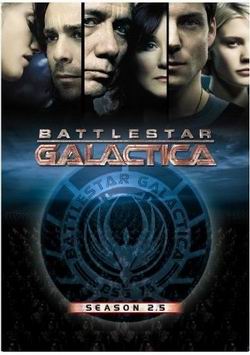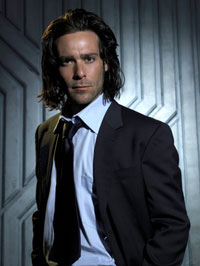 Battlestar Galactica’s Gaius Baltar is probably one of the most complicated characters on television. After his betrayal led to the destruction of 99% of humanity, Baltar ended up becoming president of the remaining survivors… before surrendering them to an occupying Cylon army. After spending some time living with the Cylons, Baltar is back on the Galactica, where he’s about to go on trial for crimes against humanity.
Battlestar Galactica’s Gaius Baltar is probably one of the most complicated characters on television. After his betrayal led to the destruction of 99% of humanity, Baltar ended up becoming president of the remaining survivors… before surrendering them to an occupying Cylon army. After spending some time living with the Cylons, Baltar is back on the Galactica, where he’s about to go on trial for crimes against humanity.
James Callis, who played Baltar, appeared at the New York Comic Con this past weekend along with the Cylon in his head, Tricia Helfer (look for her interview tomorrow!). After a quick press conference – Callis reveals that he expects to be in the Battlestar Galactica DTV movie, but in a small part as he thinks it will focus on a new set of characters – I managed to steal a couple of minutes with the man who plays a character who from week to week I either hate or find myself reluctantly rooting for.
You’re playing a character for a couple of years and then the writers spring the one year later thing on you. When you come back, how much do you know about what happened to Baltar in that missing time – do they tell you or do you fill in the gaps on your own?
This story is by way of telling you: one of the first jobs I did in the UK was a thing called Soldier Soldier, and I was asked to be a major. At the time I was 20 years old and I don’t think you could be a major in the British Army unless you were 40. I was like, how is anybody going to believe that I’m a major? The answer was that they stick you in a green suit, somebody will come in and call you major, and that’s it. So what we show you, what we present – that’s how it works. So in that scene, there was no real discussion. It was like, the camera’s going to move in, it’s going to move out, and that’s it. It’s done for you already – the audience has created the illusion by being part of it. He’s gone to the dogs, and so has New Caprica.
But for you as actor, you didn’t have to create the whole story for yourself?
I just jump in.
Is that the kind of an actor you are in general?
Yes. It’s funny – I was in a play, actually, in London, and the director just sprang up one day and said, ‘What [was your character] doing when you were five years old?’ And the actress was like, ‘When I was five I was playing with my shoes.’ Fucking hell, it was like she was a robot! They came to me and said, what about you? I’m not thinking about that! I’m in a play, and it’s about the play. If you want to waste time chatting about that crap when you’re five – maybe these things have a relevance, but oh dear. I think all of that stuff is done just to employ people. I don’t get it myself. It’s Method to a crazy degree and I don’t have the stamina to do that.
Where do you see Baltar’s story ending?
 He’s going to die, I imagine.
He’s going to die, I imagine.
He has to.
Yeah, he has to. He has to die sooner or later. You can’t avoid that, and I don’t know how much longer you can avoid it. It was Tom Stoppard who said, and he was talking about tragedy, ‘The good end unluckily. The bad end unhappily.’ I would imagine that Baltar’s end is going to be pretty unhappy.
We’re going to see Baltar’s trial soon. The show so often references history and current events – were you looking at other political trials for that? Maybe the trial of Saddam?
Yes I was. Yes I was. It was one of the reasons I was allowed to keep the beard. They didn’t want me to keep the beard and I said, ‘Have you seen pictures of Saddam?’ He looks like a guy who was pulled out of a fox hole. Actually, I wanted to look like Lazarus returned from the dead when I came back to Galactica, and I felt that the beard was a visual sign that he’s come back from the dead. He’s a changed individual.
There was one comment Saddam said in his trial; somebody came up and said, ‘I saw it all. I was there in the village when you ordered your troops in and killed all of these people.’ And he sat there – I wanted to do this – and he took the measure of the man, and said, ‘Who told you to say this?’ I thought it was amazing because in that one thing he hadn’t denied, he hadn’t made an affirmative – it sets up more questions. I thought it was amazing! So I tried to bring some of that. You’re on trial for your life and it doesn’t look good, are you going to try to be a wind-up toy and keep everybody amused? No, the buck stops, and fuck off. I think Baltar in his trial… he knows what he’s done, and thinks everybody else does. It’s all over for him, and he’s not about to play Mr. Nice Gaius in that way.
So we’re going to see a harder Baltar at the trial?
It’s after his torture, so that’s the thing. It’s not the trial. To be tortured by the Cylons he can slightly understand, but to be tortured by his own people in this way… He has a grievance and a grudge. And as well, he tried to kill himself, which is almost the only redeeming thing Baltar has ever done. Once you’ve gone through that and you’re alive, you’re a changed individual.
That episode was great, especially where Roslin threatens to put you out the airlock. That was directed by Edward James Olmos – is there a different dynamic when a fellow castmember is directing?
It’s different when Edward directs because I would do anything for him. He’s brilliant. There was a bit in that scene in the corridor and he was like, I want you to do the stuff about the man on the wall and everything, and I want you to feel this way, and I was like, I don’t feel that. He said, ‘You have to get the sympathy out of Mary, she has to wonder if she really wants to airlock you.’ I said, no, I don’t want to do that. I said, ‘You’re a man. I’m a man. What do you feel like when someone is fucking pushing you?’ And he said, ‘Then I want that! Get mad, get crazy! Get really in her face! Lose it!’ We did one take, and he said, ‘No! More furious, James!’ And I saw it played back and I was like, yes. He’s not just a brilliant director of actors, his mise en scene – the way everything looks together – he’s a brilliant artist.